Andrew Garfield Speaks Candidly On Playing The Amazing Spider-Man
The next blockbuster comic book film headed to theaters this summer is The Amazing Spider-Man, and we got the opportunity earlier this month to speak to none other than the friendly neighborhood super-hero himself: Andrew Garfield. As part of a press junket in New York City that included everyone from Emma Stone to Martin Sheen [our talk coming up later this week], including the director Marc Webb as well, it was Garfield who came off as the single most jolted and excited cast or crew member involved. Have a read on how Garfield jumped into the role of Peter Parker and his superhero alternate identity Spider-Man below, and don't forget to keep your mask on!
Be sure to check out our first look at The Amazing Spider-Man from earlier this month as well. We've also got a talk coming up that will let you dive deep into the world visual effects on the film this week. For now though, head on down to Andrew Garfield's take on the whole experience!
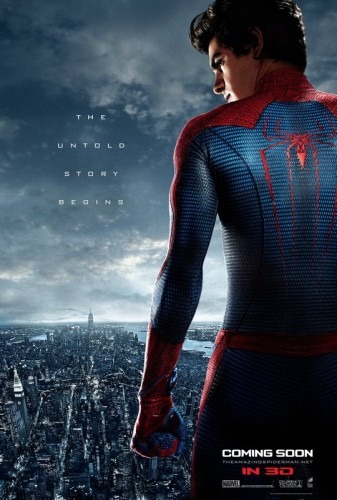
[Q] Hi Andrew, first off, congratulations on everything.
[Andrew Garfield] Oh thanks. On my life, hah. I do have a very blessed life, thank you.
[Q] I wonder if you could talk about the difference between doing low-tech stagecraft [such as with Death of a Salesman] and this, a huge blockbuster?
[AG] It's not much different, actually, weirdly enough. In terms of how I approached it, my only intention was to honor the character. That goes for Biff Loman as well as Peter Parker/Spider-Man. That was everything to me. So, my approach was the same – just from my heart and guts. I got very upset and stressed out and wanted to do a good job, as is my way. And that's kind of it. I mean, there were certain things that were challenging about both, of course.
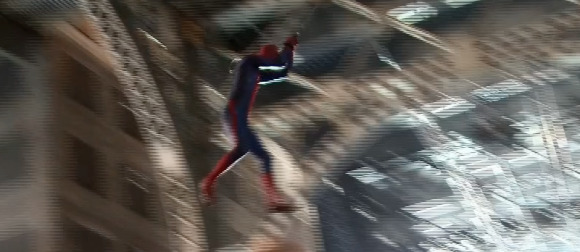
You know, the repetition of going through trauma every night on stage is a killer and your body doesn't know it's not real, even if your mind does. So, your body is in a lot of pain and your heart is in a lot of pain. But it's worth it. I will always think about that theatre experience all my life. I will hold it very, very close to me.
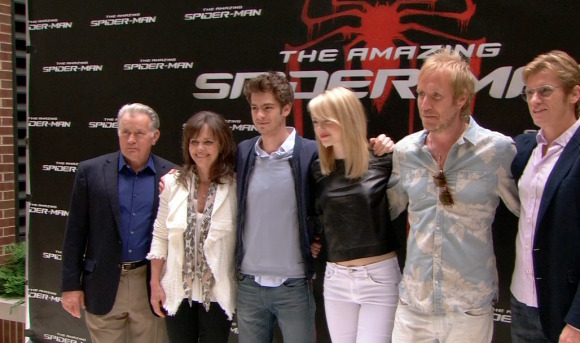
Garfield poses with cast members in NYC for The Amazing Spider-Man earlier this month.
[AG] And then with this movie, the technical aspects – the only thing that was kind of a challenge was that it was difficult to get into a rhythm because of the 3D cameras. The new technology was difficult for everyone involved. They take a lot of care and delicacy, so it meant that we were stopped occasionally. I love just going and going and going and keep it rolling, keep it rolling and screwing up and screwing up and screwing up, then occasionally you accidentally get something right and you won't know how. That's kind of how I like to work. And that's why I loved working with David Fincher because he does so many takes. I discovered how that kind of painful exactness really suits me, so that was cool.
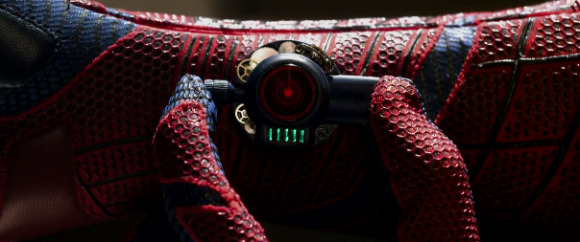
[Q] In this film you use the mechanical web-shooters. Did any of them actually work – did anything happen [when you activate them]?
[AG] Um... hah.... do I lie or not... um, no, it was a nice exercise in imagination, and that carjacker scene we had the ah – that was all improvised, that scene, so I had this idea that I could draw the Spidey image over the guy's crotch, and I think at one point they had that in there and they took it out. (I thought it was kind of cool.) But no, to be able to have that imagination do whatever you want and know that they could add it in in post was kind of liberating so I could shut that door on that guy as many times as I want, I could web him in the face, I could web a long shot – It was kind of fun. But difficult, because if it was real, it would have been awesome if it was real.
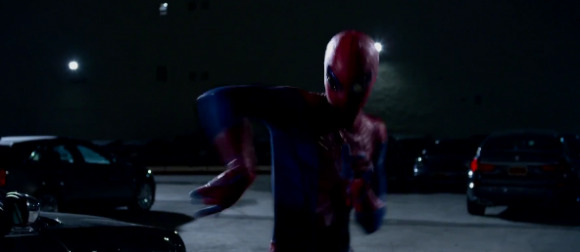
[Q] I interviewed Andy Armstrong about the swinging rigs that he built and he talked about all the training you put in to actually be able to get up there and swing yourself. What was the experience like in actually using those rigs and actually being able to get up there and swing?
[AG] Thanks for the question – any mention of Andy Armstrong and my heart swells. He kind of turned into a father figure for me on this film and remains that way. He... I can't... I will write a book about him one day. He... his team are the safest group of hands you could ever hope to meet, and passionate, supportive, loving – it's a tribe that he has. And he was generous enough to allow me to be a part of that tribe. I got no special treatment and it was amazing for that very, very, very reason.
He's a real person and he likes real people and we had an amazing time. He pushes me, you know, there were things I was scared about and like any good father he kind of told me: 'Go beyond. Go beyond what you think you can do, 'cause you might surprise yourself.' So for that reason it's kind of a spiritually overwhelming sort of experience to work with him, and of course that combines with that sensation, that physical sensation that I wanted to do since I was 3, probably what everyone in this room has wanted to do since they were 3 years old: I got to live that for a second. I'm eternally grateful to everyone at Sony Pictures for allowing me to.
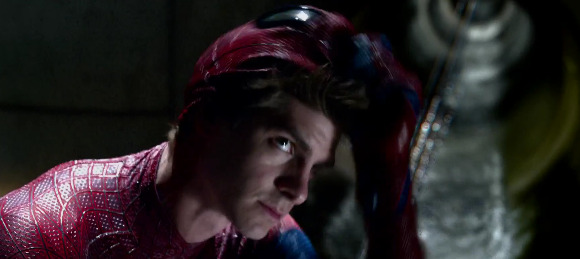
[Q] Have you received any feedback from Toby McGuire about your portrayal of the character, and if so, how did you take it?
[AG] Ah... to my knowledge he hasn't seen the movie, but I got feedback from the casting – when I got cast he sent an email to Matt Tolmach immediately that was very, very generous, and made me feel like I could take the torch in confidence and that I had that support in him. He didn't need to do that, it tells you something about his person. We're all part of that family, that Spider-Man family.
[Q] How would you describe the wonderful work that Spider-Man does in regards to him being called a vigilante?
[AG] What's cool about this movie is that he discovers... he discovers the power of what he's created. He doesn't create this... he doesn't create this symbol with any kind of high-mindedness, he creates it so he can protect himself. Because he's searching for his uncle's killer. And I think that he is a vigilante for a period of this story, of this particular story. And I think it's true for any teenager who goes through that amount of tragic events to have those impulses – to kick out, and rebel, and use their powers in a way that you're not thinking responsibly. They're not even thinking at all.
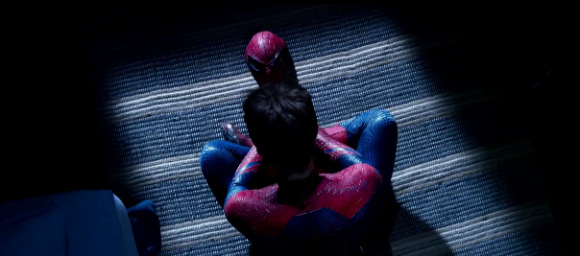
[AG] I think that whole section is Peter running away from his feelings – Peter running away from the pain, the guilt, and putting it in something physical, and sweating it out. And when he comes home to Aunt May it's sort of very difficult to be seen in that way and to see yourself in that way. So yeah, I think there is a period where he's acting out on those kinds of impulses, and he accidentally discovers that he's created something bigger than him, and that can be used for good. I think it – it was important for me that he started with a heroic impulse, he, without the physical powers doing things with it.
And that was always how I felt growing up, I felt like I was a dog and I felt like I was a skinny kid and – now I'm not obviously, I'm a just like, huge bruiser. So I got over that problem. Now I just realize that being skinny is ok, you know? I always feel I should have been bigger for that reason, because if I actually told you that, I guess – although for example like everybody played rugby, and I played rugby, and I was good at it but I got concussed all the time because I was a weakling, So that's something I would identify with for Peter, you know, he always just felt stronger on the inside than he did on the outside.
And there's nothing better than seeing a skinny guy beat the crap out of big guys. So that was just kind of important for me.
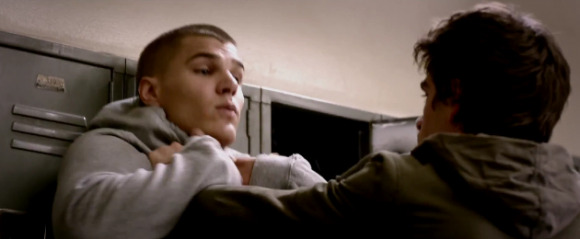
[Q] You say in a lot of interviews how much just Spider-Man truly meant to you as a child growing up and this end result now, and [Marc Webb] has mentioned that you wrote a personal note to him that really moved him. I'm wondering if in your long history with Spider-Man you – can you tell us what it was like to meet Stan Lee for the first time and how that ranked as far as maybe like nerve-racking experiences inclusive with things like auditioning for this role which is nerve-racking enough?
[AG] Yeah, yeah, I've been at this for the past two years, it seems like, every day there's been something that like has made me have to suppress shaking. So, but Stan Lee was a weird one because... he wasn't real. He's too iconic to be real. So it wasn't like I was in a room with a human being, it was like I was in a room with a wax figure, you know? I was at Madame Tussauds.
It... It made no sense. I wasn't nervous, I was just like... I was one of those annoying people who is like *makes open faced gawking expression* And he was just like... *waves hand in front of face* 'I'm here...' And he's amazing, he's everything that you think he is.
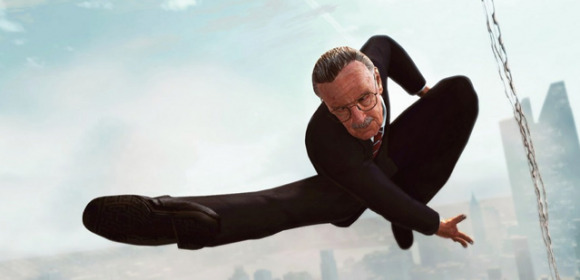
Stan Lee also appears in The Amazing Spider-Man video game as a playable character.
[Q] When did you meet him?
[AG] He came on set, so I met him in the makeup trailer once, and then he came on set again and he did this amazing cameo in the library... It was just, it was just beautiful because when you really truly understand what he's given to us... he's given so many kids hope, and joy, and you cannot thank enough for that. It was like being in a room with Mickey Mouse, you know, it was bizarre. So I wasn't actually nervous, in a weird way. That was the one day I wasn't actually nervous.
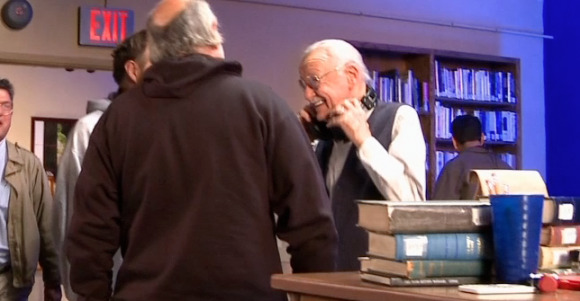
[Q] You've said you want to audition for every part that you want. Why is it that you feel you have to audition? Is it a challenge, and what do you get out of it?
[AG] Sometimes there are actors who reach a certain level of notoriety or visibility where they don't need – they may get offered roles based on their monetary value or the idea that they will bring in an audience. They may not be right for the part or they may not serve the story in the way that they should. I'm not saying that I'm in that position, I'm just saying that that is something that I fear.
Like, here's a weird analogy: if you're in a pool hall and you're playing pool and you have to put in 50 cents every time, you're going to enjoy that game because you paid for it. But if you figured out a way to jimmy the thing and you can get a free game of pool out of it, you're not going to care so much about the game.
There's something in that about feeling like you've earned something as opposed to just being handed something. And luckily I haven't experienced that. I've had to work for everything that I've been a part of, and there's just something satisfying about it because you know that they looked at everyone and that you are the right person for that particular story at that particular moment. I guess there's something about staying grounded and humble, and making sure that you appreciate everything you have as well.
[Q] You had one of the most memorable introductions at Comic Con [as seen in the video above]. Why did you choose to go that full confessional route? Did you feel like you needed to or were you driven to and you thought that was the right audience?
[AG] It wasn't really thought out. I was compelled, for many reasons I think – if I analyze it. I am terrified to take on this role because it means so much to me, so I know how much it means to other people. And I think it has something to do with actors being on stage... I wanted to be on the ground. I wanted to be in the audience watching the panel. I didn't want to be in the panel. That's where I thought I just belonged more, so I guess I just kind of extended that idea.
I kind of wanted to do the whole speech in the mask, just out of sheer protection, you know? There is something odd about the separation between actors and the audience that I don't really care for. That's why I love theatre so much. That's why I loved the great show that was here in New York called "Sleep No More", which is all audience participation. You basically walk around and you're immersed in the experience, and there's no separation from the actors and the audience.
I don't know – I'm not really answering your question. I just wanted to feel connected to the fans in a real way because I'm a fan first and foremost. It just felt like the right thing to do. It was a scary thing because who knows what would have happened. But it just felt like an opportunity to have fun as well.

[Q] What did you do to make sure you got the part of playing a teenager right – not necessarily a teenager who develops powers? Is there research that you did?
[AG] agree that the teenage element is incredibly vital to this particular superhero and this person, this character. The fact that he goes through the same stuff I went through, that's why I love him so much. Because I thought if I was him. That's why everyone feels like he's him because he's all of us. He really is.
So the teenage thing, I don't know. I did spend time in Queens hanging out with teenagers and a lot of recording the voice and intonation and picking up phrases that I might not be aware of or a general attitude. That malaise and the awkward shyness – every aspect.
There was a great book I found for inspiration called "Teenage", which is a book of photographs. I wouldn't buy it because it's too expensive, but actually the marketing department at Sony bought it for me very, very generously as a gift. I saw the price and I'm like, 'You guys are crazy! Thank you so much.' But it's awesome. The energy of the photos in that is what I wanted to capture. It's tongue on tongue.
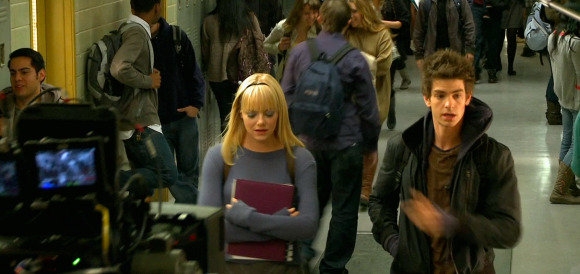
[AG] It's just head out the window, that need to express, that need to kick the walls down irrationally.
Which, when you combine that with being a superhero, that is kind of exciting. There's that scene on Gwen's bedroom floor where she's nursing me and we have an intimate, kind of heavy moment of like she's terrified I'm going to die and I'm terrified of what I've done to my mentor. At the end of that scene it's – 'Let's just get out of here. We've got to get out of here.'
In a previous version – we shot a lot more – we have a date night where it's expressive and free and teenage and romantic and silly. But that feeling is something that I really wanted to capture, especially in those moments between Gwen and Peter.
So, "Teenage". Check out that book. It's too expensive. Find someone who has it and look at the pictures. You'll be like, 'Oh god – I remember that feeling.'
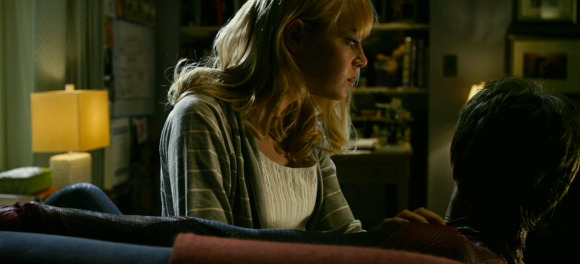
[Q] Can you compare and contrast kissing scenes with killing scenes and doing romance as opposed to doing death-defying action on screen?
[AG] They're all pretty scary things. Hah. Yeah, they're all pretty scary. I actually felt more safe when I was swinging around because you have a very, very strong safe pair of hands holding you up. In the romantic scenes, I'm free-falling in a way, as they should be. They have to be spontaneous and free and terrifying, because that's what first love is.
First love is the scariest thing to ever go through and the most exhilarating. You've got so much to lose. So they were actually more frightening than swinging through the buildings, in a weird way. And especially because it's Emma, and she's terrifying.
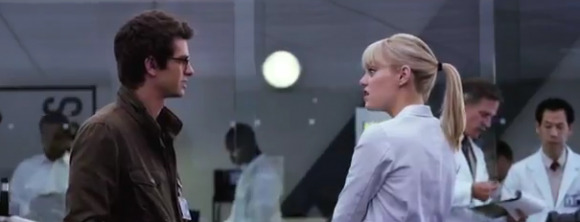
[Q] Could you talk about the physical transformation you had to go through, the training, and the stunt coordinating? Was there a particular moment you're really proud of?
[AG] It's so nice to be able to look at a movie and feel ownership. It's a really nice thing to be able to feel that, because of Andy's trust and his encouragement of me. There was something specific that I wanted to do with the physicality that wasn't just a guy in a suit throwing kicks and punches and saying cheesy lines.
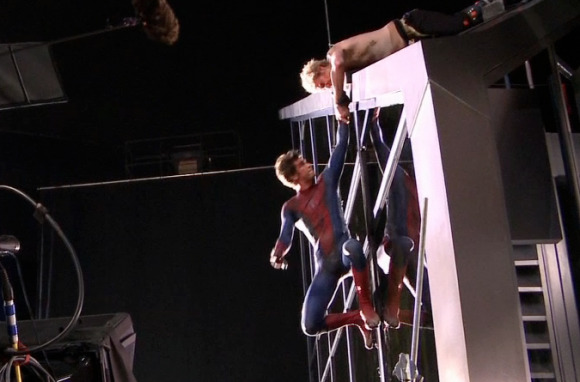
[AG] I wanted it to be a "Spider-Boy" in the way that if we ground this film in reality, then what happens when spider DNA is running through your bloodstream? What happens to the teenage boy who is fidgety and nervous and can't really keep still? He discovers that he can now have patience, like a spider.
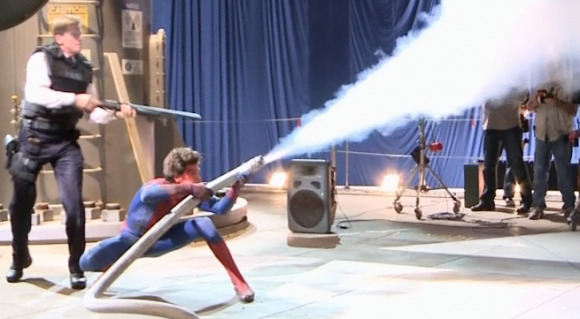
[AG] There was another scene that they cut out which was awesome, which is me and when the Chinese thing goes in the trashcan when I'm on the computer, but I was doing something with all my limbs – doing different things – and they melded two shots and I thought it was really, really cool. I was moving a lamp with my left, I was typing with my right foot, I was eating Chinese, and I was reaching for something behind me, and it didn't get in the movie. Maybe I'll cut my own movie on bits that I like. *laughter*
So, yeah, that was really fun.
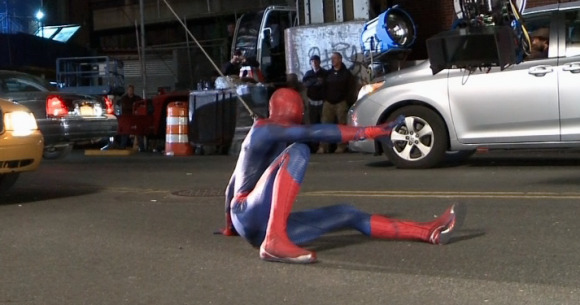
[AG] And there was a lot of great physical stuff that made it, like for instance the scene where I get all the food out of the fridge. The kind of spatial awareness that you have in this film is like, 'Peter doesn't move like that. Peter doesn't glide like that before the spider bite.' And the way he's moving around the space, he's kind of walking by the wall as opposed to walking straight through the room. He's kind of got his back to the wall.
That kind of thing is fun to play with, but then of course the training is horrible. Like the physical training changed my body because I'm a lazy guy. I'm vain, but I'm not vain enough to care about the gym. And Armando Alarcon was my trainer and he's a fantastic trainer and a terrible person. *laughter*
I have very confused feelings about Armando. Wherever he is, he knows that. He's hiding from me because he will be murdered one day. No, but we had a great time. I was thankful for him. He kept me on an even keel all the way through, and that combined with the whole stunt team was a pretty awesome experience.
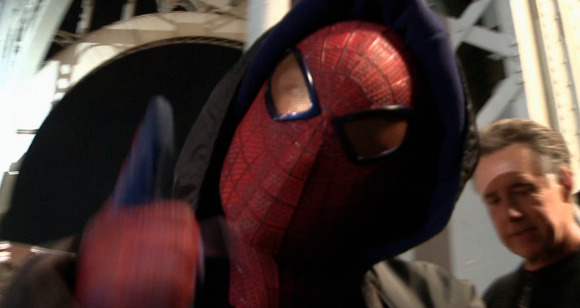
[Q] Did you have any issues with the costume that you were aware of at all, were you wearing it out in public, anything like that?
[AG] You know, I had many issues with that costume. *laughter*
But every actor who plays a superhero is like, 'the costume sucked.' Like, we should just get together to talk about it because it's so inappropriate to talk about in public. It's like – how dare we complain? We're the ones that get to wear it. It's the dream.
But, it was so terrible. No – Let me just put it this way: the fantasy of wearing those costumes is really awesome. We should just enjoy that.
Catch our whole Spider-Man series of interviews as the week goes on right here on SlashGear, and don't forget to hit our Entertainment portal for more big-ticket film action through the future as well. Finally, don't forget to check out The Amazing Spider-Man as it hits theaters July 3rd here in the USA!
